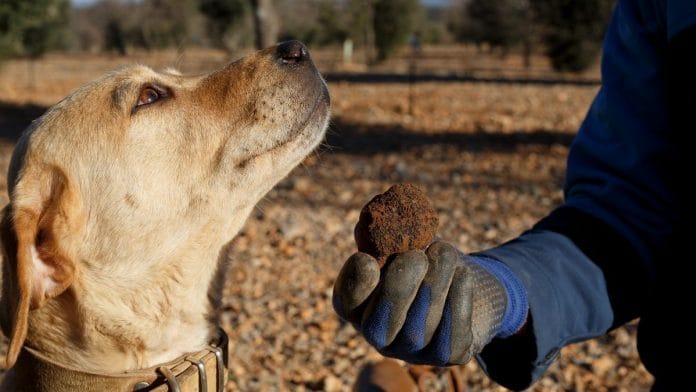A two-year study has shown dogs can be trained to identify malaria by sniffing a patient’s socks, with 70% accuracy.
Bengaluru: Our best friends, the dogs, never cease to surprise us with their wide array of talents. In a study spanning two years, scientists and researchers from Africa and the UK managed to train dogs to sniff out malaria from a patient’s socks with 70 per cent accuracy.
The results of the study were presented at the annual meeting of the American Society of Tropical Medicine and Hygiene (ASTMH), which was held in New Orleans, US, this week.
It is no secret that dogs have an unnaturally strong sense of smell. Their noses have been a great aid to us through centuries. They are master trackers, able to sniff out scents of animals from far away.
They’ve helped us hunt by not only identifying game but also by retrieving. They are known to alert humans to the presence of predators, and can take a whiff of a missing person’s clothes and track them through miles. In more recent times, they have been trained to efficiently sniff out drugs and bombs.
Dogs have also been able to detect sickness in people, with therapy dogs often being by the side of children affected with epilepsy or diabetes. To tap this potential of dogs, researchers decided to collaboratively train our canine companions to identify a disease that has plagued the human race since time immemorial: Malaria.
“People with malaria parasites generate distinct odours on their skin and our study found dogs, which have an incredibly sensitive sense of smell, can be trained to detect these odours even when it’s just on an article of clothing worn by an infected person,” said Steven Lindsay, a public health entomologist at the Department of Biosciences at Durham University, UK, and the lead investigator on the study.
A dog’s sense of smell is as strong as it is thanks to a whole host of smell sensory receptors. An average human has five million sensory receptors in their nose that help us navigate through smells in our daily lives. Dogs have a whopping 300 million receptors on average. That makes their sense of smell 10,000 to 100,000 times as strong as a human’s.
This is complemented by a brain that contains a large olfactory cortex, while human brains are dominated by the visual cortex.
Also read: Tata’s Bombay House isn’t just for employees, stray dogs get a swanky room of their own too
An epidemic
The study, which was funded by a $100,000 Grand Challenges grant from the Bill & Melinda Gates Foundation for identifying non-invasive diseases, goes back two years.
In November of 2016, researchers from the Medical Research Council Unit The Gambia at the London School of Hygiene & Tropical Medicine (LSHTM) visited primary schools in the West African country, where a malaria epidemic was afoot.
The team recruited a group of young children, sampled their blood for malaria, and distributed socks to them. The children were instructed to wear the socks overnight, and to take them off only to wash their feet for prayer.
The next morning, the socks were collected and sorted into two piles: The ones worn by children who tested positive for malaria, and those worn by children without the disease. They were then shipped to the LSHTM, where they were stored in a freezer.
In London is a charity that works with dogs, called Medical Detection Dogs (MDD). Over the next four months, MDD worked with LSHTM to train their dogs to identify the socks worn by malaria-infected children.
During training, the dogs were trained to move along when they sniffed an ordinary sock, but stand still when they smelled one with the malaria parasite. The dogs were able to identify infected socks 70 per cent of the time and uninfected ones 90 per cent of the time.
The researchers believed the malaria diagnosis figure would have been higher if all the children were at the same stage of disease.
Also read: No, the Indian Army does not kill its dogs after retirement
A crying need
‘Biodetection’ is not a new concept, especially with dogs. Gifted with the ability to identify a substance in quantities as low as a part per trillion, they have been known to consistently be able to identify diseases, spikes in hormones, blood sugar level variations, onset of epileptic fits, onset of a heart attack and more.
The charity MDD has previously trained dogs to detect prostate cancer and when a person is about to enter diabetic coma.
As the mosquito menace becomes more serious, researchers across the world are attempting to come up with novel solutions that can rid us of diseases these pesky creatures carry.
As CRISPR technology develops, scientists are looking at modifying the genome of certain species of mosquitoes so that they can either not multiply or not carry a parasite. While a GM mosquito field trial might prove to be expensive and tricky, and nowhere in our line of sight in the near future, dogs can be a very useful alternative.
James Logan, head of the department of disease control at the LSHTM, said: “Worryingly, our progress on the control of malaria has stalled in recent years, so we desperately need innovative new tools to help in the fight against malaria.”
In our fight against the mighty mosquito, perhaps dogs could bail us out, like they always do.
An earlier report included an error in the name of the Medical Research Council Unit The Gambia at the London School of Hygiene & Tropical Medicine. The error is regretted.






